Afternoon Blog - 06 December 2010
Criticism, analysis, response: The BudgetJam liveblog. Email you comments here or comment below.
17.51 Michael Lowry was just on Drivetime explaining his decision to support the budget. I copied down a few lines - if anyone doubts the list of myths BudgetJam is built around the following should set your mind at rest:
Lowry: 'The consequences of not passing a budget would be disastrous for Ireland...We will suffer irreparable reputational damage...I came to the conclusion but that we had no alternative but to honour and comply with the budgetary parameters set out by the ECB and IMF.
As far as I'm concerned this country is in grave economic danger...I felt duty bound to put the country first and do what is right by our country and its people
As you know I'm a constituency politician...I didn't go into the government with any particular demands...My main consideration in relation to this was the national issue...If we don't have access to the fund from the IMF we won't be able to pay our social welfare...and that is the reality of it.
That project [casino] stands on its own merit. It will generate economic wealth right around the region.
I have put my country before my constituency today...
I have put the people first, I have put the nation first. To run our economy this is the only approach, we don't have an alternative. We don't have the luxury of trying to be popular.'
Hum. I'll take your word for it Michael. Mostly cos I respect you as such a fine and upstanding guy. I'm away off out of here now, Miriam Cotton is up next to take you through the latter part of the evening.
17.50 One last bit from Twitter before I hand over to Miriam for the evening.
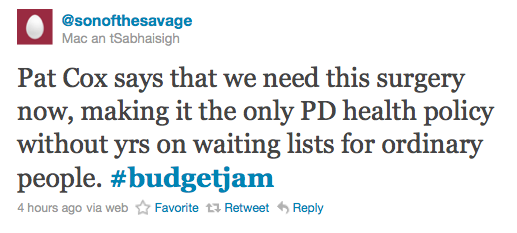
17.31 And budgetjammer Gavan Titley has this to say on Mr Lowry:
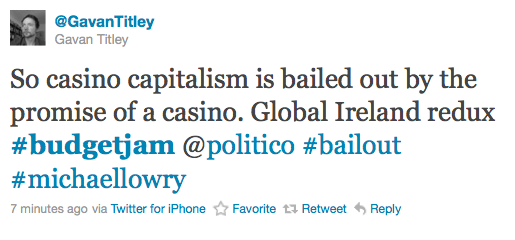
Other responses ranged from the scathing:
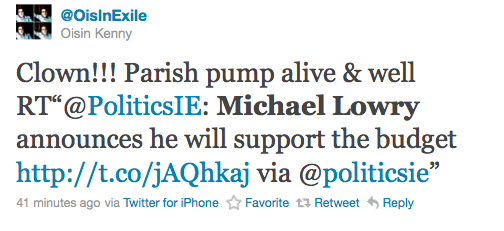
To the even more scathing:
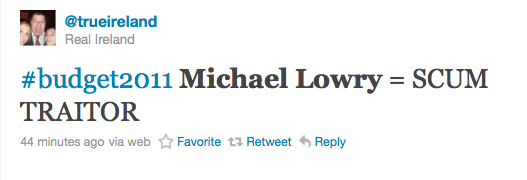
Not a popular man with the Twitterati, then.
17.27 The folks over on Politics.ie welcome Michael Lowry's decision to support the budget with open arms:
Simbo67: What a silly man.
king5494: what an idiot.one must remember once corrupt always corrupt.
sport02: Gombeen Father Ted politics.
Fantasia: so its settled then. a mega casino to be constructed on top of the Carrigeen Mountains
16.50 Over on Dublin Opinion Conor McCabe brings us the glad news that Brian Lenihan and Jools Holland will be hooking up for tomorrow's budget speech.
'The Department of Finance has just announced that Minister Brian Lenihan will give his budget speech while accompanied on piano by the eponymous presenter of “Later with Jools Holland.’
The Dáil chamber has been specially adapted to facilitate the musician and to allow him to play his classic riffs while the Minister cuts the bejaysus out of the economy.
The Minister for Finance said that he is delighted that Jools will be accompanying him on tomorrow’s budget.
‘It is going to be great’ he said, ‘and we will have Garda marksmen on standby with sedative darts from the zoo in case Cowen decides to join in with a chorus of the Offaly Rover.’'
They've a preview video posted - go check it out.
16.40 Thanks to Donagh for this:
It is further stated that, of the €35bn in further funds for the banks, only €10bn is for their immediate recapitalisation - the remainder is for 'contingencies' in the banking sector (which is almost exactly the same as the NPRF's former level of assets, just to underline who it is here that is being protected. It turns out the NPRF was 'rainy day' money for the banking sector, not its contributors.).This further lifeblood for what are already zombie banks will cost over €1.7bn annually at a 7% interest rate. This annual cost is a large proportion of the planned cuts to current expenditure in December's Budget (€2.09bn), including social welfare, public sector job losses, public sector pensions and 'other expenditure' on goods and services.
Or, it is amost exactly the same as the planned reduction of €1.8bn in govt. capital expenditure.
16.00 Via Eoin O'Mahony:
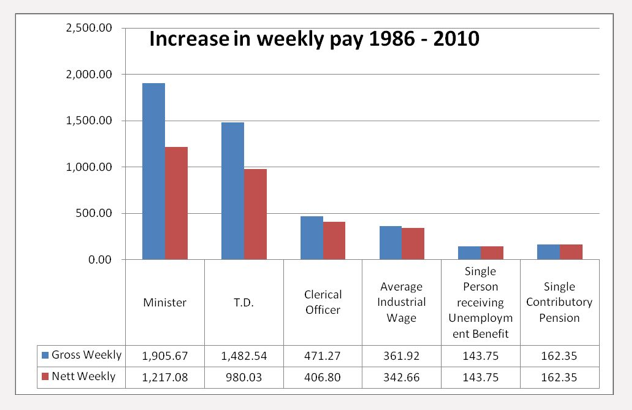
Graph from Social Justice Ireland. They say:
'Research produced by Social Justice Ireland shows that the take-home pay of TDs rose by €980 a WEEK since 1986 while unemployment benefit rates only rose by €143.75 in the same period. Government ministers’ take-home pay rose by more than €1,200 a WEEK in the same period.'
I'd be interested to know what the relative increases weighted against inflation over the period were - anyone got any details?
15.30 'Evidence based social policy' is a phrase I first came across in a comment on an article by Ben Goldacre over on badscience.net. Google it and click into the 'News' results and you'll see this:
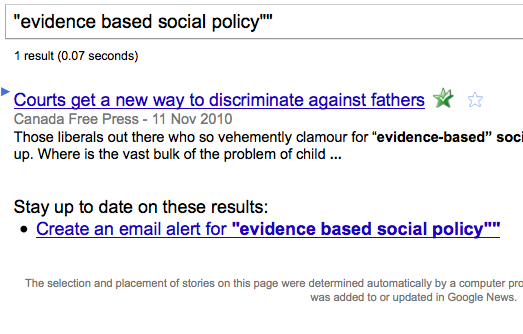
That's right, one result. I thought of this when a mail from Justin Frewan dropped into my inbox just now. It contains a slew of links to reports on the effects of poverty and inequality on health, physical and mental, along with stuff on the likely effects of the budget on the least well-off. We'll hopefully post those up later, but for now I want to bang on for a little while about the possible reasons for social policy making so rarely being based on any kind of evidence.
From a 2008 UNECE report:
Evidence-based policy has been defined as an approach which “helps people make well informeddecisions about policies, programmes and projects by putting the best available evidence at the heart of policy development and implementation” (Davies, 1999a). This definition matches that of the UN in the MDG guide.
Here it is stated that “Evidence-based policy-making refers to a policy process that helps planners make better-informed decisions by putting the best available evidence at the centre of the policy process”.
This approach stands in contrast to opinion-based policy, which relies heavily on either the selectiveuse of evidence (e.g. on single survey irrespective of quality) or on the untested views of individuals or groups, often inspired by ideological standpoints, prejudices, or speculative conjecture.
Many governments and organizations are moving from “opinion-based policy” towards “evidence-based policy”, and are in the stage of “evidence-influenced policy”. This is mainly due to the fact that the policy-making process is inherently political and, that the processes through which evidence translates into policy options often fails to meet required quality standards.
(emphases mine)
I talked earlier about the political (ethical, moral) aspects of economics, and the folly of trying to strip those elements from the process whereby decisions about the economy are taken. Lest I be misunderstood (and I have been on this one before) - my main issue with economics is its predictive power (or lack of it), along with the co-option of empiricism for particular ideological ends; a co-option which more often than not bastardises the entire process because, as the excerpt from Dan Ariely below points out, such empiricism often isn't very empirical at all.
A similar thing tends to happen with social policy making, and we're seeing a rash of it at the moment as the government bleats on about the 'need' to cut the minimum wage; the 'need' to cut social welfare and so on, all purely on the basis of either (a) no evidence, or (b) a failure to cross-reference with other evidence and come to some kind of informed conclusion. I guess what I'm trying to get at here is the idea that there are tens upon hundreds upon thousands of review reports out there which could be used to make decisions about social policy but which receive at the very most lip-service from those in power (and by 'those in power' I'm looking at you too, media). Surely the job of journalists is to investigate? Surely there's a space beyond the blogosphere for a bit of light fisking of government statements on the absolute 'need' for such and such a decision? I think it's blindingly obvious to anyone with half a brain that the cuts due to be announced tomorrow are based far more on ideology than on evidence - so why, then, do I get one single lonely news result for the phrase 'evidence based social policy'? And why, as they (government, experts, journalists) have their cake and shovel it in their mouths simultaneously, am I constantly lectured on the complex empirical bases for all of this craic when there is none?
15.00 Naomi Klein's Disaster Capitalism has been mentioned a few times on this blog so it's worth flagging up another writer who has done extensive work on capitalism's frequent crises and their function - David Harvey. (Now that I come to think of it I do think somebody made mention of him last week and described him as 'the kind of Marxist you can bring home to your mammy.)
He gave an excellent talk at the RSA in April of this year on 'the crises of capitalism'. It's embedded below, and is essential viewing, as is his book on the same subject (though that's essential reading).
14.50 New post by Eoin O'Mahony on 'Rage within the machine' up now. He writes:
'One of the sure signs that cages are rattled amongst the architects of this crisis is the anger with which dissent is met. Earlier today Conor McCabe crystallised an excellent argument about mass media doing exactly what they're supposed to do: culminating in shouty rage which is amplified by Frontline and Liveline. Conor writes of mainstream media in Ireland:
Today, when you turn on the radio, pick up a newspaper, or watch the TV, all you see and hear is screaming. Blind, mindless panic. They didn’t know what was going on back in 2006, and they sure as hell haven’t got a clue as to what is going on today. They don’t understand. Their way of seeing the world is out of step with the way the world works.'
14.30 Bit more on rational markets, from a book by Dan Ariely. It's a little bit pop, this book, but demonstrates well that people are not purely 'rational, self-interested maximisers'. From the conclusion:
'Neoclassical economics is built on very strong assumptions that, over time, have become "established facts". Most famous among these are that all economic agents (consumers, companies, etc., are fully rational, and that the so-called inivisible hand works to create market efficiency). To rational economists, these assumptions seem so basic, logical, and self-evident that they do not need any empirical scrutiny.
Building on these assumptions, rational economists make recommendations regarding the ideal way to design health insurance, retirement funds, and operating principles for financial institutions. This is, of course, the source of the basic belief in the wisdom of deregulation: if people always make the right decisions, and if the "invisible hand" and market forces always lead to efficiency, shouldn't we just let go of any regulations and allow the financial markets to operate at their full potential?
On the other hand, scientists in fields ranging from chemistry to physics to psychology are trained to be suspicious of "established facts". In these fields, assumptions and theories are tested empirically and repeatedly. In testing them, scientists have learned over and over that many ideas accepted as true can end up being wrong; this is the progression of science. Accordingly, nearly all scientists have a stronger belief in data than in their own theories. If empirical observation is incompatible with a model, the model must be trashed or amended, even if it is conceptually beautiful, logically appealing, or mathematically convenient.
Unfortunately, such healthy scientific skepticism and empiricism have not yet taken hold in rational economics, where initial assumptions about human behaviour have solidified into dogma. Blind faith in human rationality and the forces of the market would not be so bad if they were limited to a few university professors and students taking their classes. The real problem, however, is that economists have been very successful in convincing the world, including politicians, businesspeople, and everyday Joes not only that economics has something important to say about how the world around us functions (which it does), but that economics is a sufficient explanation of everything around us (which it is not). In essence, the economic dogma is that once we take rational economics into account, nothing else is needed.'
It's worth noting that an economist who has spent her career debunking 'established facts' about human nature and human greed, Elinor Ostrom, won the Nobel in economics in 2009 (it's not really a Nobel, since there isn't one for economics, but the equivalent). Her work, in conjunction with an increasing body of evidence from experimental economics (for example, the work of Ernst Fehr, Sam Bowles and Herb Gintis) is a serious challenge to the idea of 'homo economicus' - the rational, self-interested, utility maximising spectre that has haunted theories of economic and social behaviour for so long. Pity those ideas have yet to 'trickle down' into mainstream debate.
14.18 While I put together another cranky post (where's me Mogadon til I calm the hell down) amuse yourself by playing along with this afternoon's Joe Duffy using this.
13.50 I'd rather rip my own heart with a spoon than engage in the public-sector-is-overpaid-and-underperforming-blah-blah-blah that makes the easiest of all pickings for journalists looking to stir up fights but this in the Guardian is interesting nonetheless:
Top 10 earners in the Irish public sector (state and semi-state)
1. Head of ESB: €752,568
2. Head of Dublin Airport Authority: €568,100
3. Head of An Post: €500,000
4. Head of Coillte, the forestry commission €417,000
5. Head of Voluntary Health Insurance: €412,003
6. Head of Bord Gais: €394,000
7. Head of Bord na Mona (turf energy agency): €392,000
8. Head of RTE: (TV): €326,000
9. Head of CIE (transport): €252,416
10. Head of Health Services Executive: €335,913
Interesting less for the pitchfork waving rage it might engender in some people at what Lisa O'Carroll describes in the same piece as the 'morbidly obese cats' at the top of Ireland's public sector, and more because it's a salutary reminder of the effectiveness of the argument that 'To get the best people, you have to pay a premium.' I don't believe that for a second. 'Best'? Them lads in Goldman Sachs are 'the best'? Hugh Green directed me to this last week:
Most men are encouraged to assume that, in general, the most powerful and the wealthiest are also the most knowledgeable or, as they might say, the smartest. Such ideas are propped up by many little slogans about those who “teach because they can’t do,” and about “if you’re so smart, why aren’t you rich?” But all that such wisecracks mean is that those who use them assume that power and wealth are sovereign values for all men and especially for men “who are smart.” They assume also that knowledge always pays off in such ways, or surely ought to, and that the test of genuine knowledge is such pay-offs. The powerful and the wealthy must be the men of most knowledge, otherwise how could they be where they are? But to say that those who succeed to power must be “smart,” is to say that power is knowledge. To say that those who succeed to wealth must be smart, is to say that wealth is knowledge.
C. Wright Mills, On Knowledge and Power, 1954.
It's an idea that has come to dominate in both the public and private sectors. And it hasn't come to dominate because of any evidence to back it up. Like 'We are where we are' or 'We're all in this together' it's a mealy platitude trotted out by vested interests to ensure that those interests aren't disrupted.
13.40 Since I was just talking about science I feel justified in mentioning that Seán Moncrieff is having an utterly braindead conversation with some braindead lady about climate change.
'My husband said to me that the cold is because of global warming. Global warming! I haven't been warm in Ireland for five years!'
Moncrieff: 'Apparently global warming will make us colder. That's the theory anyway.'
Lady: 'Hmph. "Apparently". "Theory" Ho ho.'
Moncrieff: 'Hur hur hur'
They're now talking with straight faces about a mathematical formula for the perfect Christmas. Thing is, these utter utter fools are the kinds of people who have a hand in dictating the public agenda in this country. Think on.
13.20 I've been thinking a lot about rigour in economics recently. Economics is described as a science (as for example here: 'Economics is scientific; it follows the scientific method of stating a formal refutable theory, testing the theory, and revising the theory based on the evidence') but I've always had enormous problems with non-physical sciences assuming for themselves the predictive power of the physical sciences. While economics may well state, test, and revise theories, it cannot control variables in the same way as, say, experimental physics can. An extra element of confusion comes into the mix when power differentials are thrown in. In the Matt Taibbi piece Michael made brief reference to in yesterday evening's liveblog he talks about manipulation of oil prices by Goldman Sachs. He says:
'Complicating matters even further was the fact that Goldman itself was cheerleading with all its might for an increase in oil prices. In the beginning of 2008, Arjun Murti, a Goldman analyst, hailed as an "oracle of oil" by The New York Times, predicted a "super spike" in oil prices, forecasting a rise to $200 a barrel. At the time Goldman was heavily invested in oil through its commodities trading subsidiary, J. Aron; it also owned a stake in a major oil refinery in Kansas, where it warehoused the crude it bought and sold. Even though the supply of oil was keeping pace with demand, Murti continually warned of disruptions to the world oil supply.'
So I do wonder about the capacity of any economist to accurately predict the outcomes of budgetary measures, particularly in the context of globalised markets. More to the point, I am becoming a little bit weary of this idea that the choices we make about how we spend the money we have devolve solely on a rational accounting of the figures, and that nothing else comes into play. If economics did, indeed, have the capacity to control for all variables and make predictions therefrom that would be a sensible approach. But there are enough potentially disruptive influences on its predictive capacity that there's a very real need to stop denying that economic choices are political ones first. Hiding behind the mask of science is the hallmark of quackery the world over. I'm not going so far as to say that economists are quacks - what I'm trying to emphasise is that a journalistic obsession with reporting the field as if it wasn't as discursive as it is scientific is an enormous problem. And the old journalistic habits of balancing, objectivity and 'straight reporting of the facts' is ill-equipped to deal with a world where political arguments have to take place, and sides have to be taken. There are no magic bullets, and nobody, anywhere, is going to find all of the answers in numbers.
13.10 This in from Hugh Green:
Came across this piece from El País yesterday. It's mainly about the relative health of the Spanish banking sector by comparison with Ireland. But there is an excerpt worth considering:
To translate:
What has happened to the Celtic Tiger? Ireland has been governed by a caste of neo-liberal ['liberal' in the original] Taliban who believed that fairy story about the invisible hand and free markets.
'Taliban' isn't so much of interest here as the 'liberal' adjective. In Spain, liberal means roughly something containing elements of so-called classic liberalism and neo-liberalism. That is, there is a word in common usage, which appears regularly in broadcast and print media, to describe the economic policy position of right-wing political parties.
But if you examine media coverage of the economic policies of Irish political parties, there is rarely any name used for them. That is, whilst the upcoming budget will be an expression of neo-liberal priorities in addressing a crisis which is itself a classic product of neo-liberal policy, 'neo-liberal' is rarely used beyond the margins in media discourse. Fianna Fáil, Fine Gael and Labour all just have policies, judged in terms of how they serve the 'national interest'. The beast goes unnamed.
13.00 Eadaoin here, taking over for the afternoon. Cheers to Eoin and Colin for their ever stellar work this morning. Colin's last post mentioned a few protests coming up in the next few days - we've created a standalone list here which we'll be updating throughout the week. If we've missed any out mail us (budgetjam@gmail.com) or leave a comment. Also, if you're at a protest taking pics or filming send the results on to us and we'll post them.
{jathumbnailoff}
